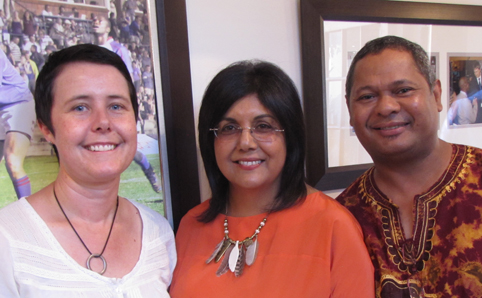Latest News Archive
Please select Category, Year, and then Month to display items
14 June 2024
|
Story Anthony Mthembu
|
Photo Suplied
 Jeremiah Hlahla, a UFS student completing his PhD in Botany at the University of Debrecen as part of an exchange initiative funded by the Erasmus+ Mobility Programme.
Jeremiah Hlahla, a UFS student completing his PhD in Botany at the University of Debrecen as part of an exchange initiative funded by the Erasmus+ Mobility Programme.
As part of an exchange initiative facilitated by the Erasmus+ Mobility Programme, Jeremiah Hlahla, a student at the University of the Free State (UFS), is nearing the completion of his PhD studies at the University of Debrecen in Hungary. Hlahla’s journey, which began in February 2024 and is set to conclude in July 2024, has been a remarkable learning opportunity. “As a first time-traveller to Europe, I have thoroughly enjoyed engaging with people from different countries and cultures,” he said.
The benefits of international collaboration
Hlahla is currently pursuing a PhD in Botany, focusing on plant stress physiology. “My current PhD project investigates the physiological, biochemical and morphological responses of vegetable-type soybean, or edamame, to combined drought and heat stress,’’ he explained. He considers the University of Debrecen the ideal institution to complete his research due to its extensive expertise and resources in similar projects. He noted that his colleagues at Debrecen conduct significant work on plant protection against biotic and abiotic stresses, including salt and drought stress, as well as proteins and amino acids in barley and other legumes.
Given the vast knowledge available on similar projects, Hlahla has found substantial engagement with his work at the University of Debrecen. “Upon arrival, I delivered an introductory lecture presenting my UFS project on the synergistic effects of combined drought and heat stress on the physiology and biochemistry of edamame. It was an engaging session as everyone could relate to my work and asked many questions,’’ he said.
Insights gained from the exchange
Hlahla has also gained valuable lessons that will assist him in his research career, including biotechnology and physiology tools. “I learned how to prepare samples and use high-performance liquid chromatography (HPLC) and reversed-phase ultra-high-performance liquid chromatography (UHPLC) to quantify proteins and amino acids,’’ he said. These techniques are beneficial not only for his current work but will also support future soybean research.
As his experience at the University of Debrecen nears its end, Hlahla reflects on the collaborations and friendships he has formed, which stand out as a significant highlight.
‘We need a story that will excite us all’
2012-03-09
 |
|
Attending the conversation were, from the left: Willemien Marais, Lecturer in the Department of Communication Science; Zubeida Jaffer; and Prof. Andre Keet, Director of the International Institute for Studies in Race, Reconciliation and Social Justice.
Photo: Amanda Tongha
9 March 2012
|
“From the stories of Afrikaner Nationalism and Black Consciousness to the stories of our Constitution and the 1995 Rugby World Cup… But now what do we have?”
This was the question posed by Zubeida Jaffer, recently appointed as the university's Writer-in-Residence. Do we need a new national narrative? was the issue addressed by Ms Jaffer in a talk presented as part of the Critical Conversations series hosted by the university’s International Institute for Studies in Race, Reconciliation and Social Justice. Ms Jaffer is an award-winning journalist and author of, amongst others, Love in a time of treason and Our Generation.
“We can’t change the past and we can’t keep on focusing on separate narratives; we need to find a story, a new national narrative with elements that could excite all of us,” she told an audience consisting of academics and students. She also referred to the changes that took place at the university. “I’m fascinated by what is happening here. It’s mind-boggling to see the changes.” Based on the UFS’ drive to find common ground, Ms Jaffer told the audience that research at universities could and should direct this search for a common South African story.
In reference to her own experiences as a community activist and journalist during apartheid, she urged students to become active citizens. “In my time students were the leaders; they gave direction to the national debate.”
Article (pdf format)